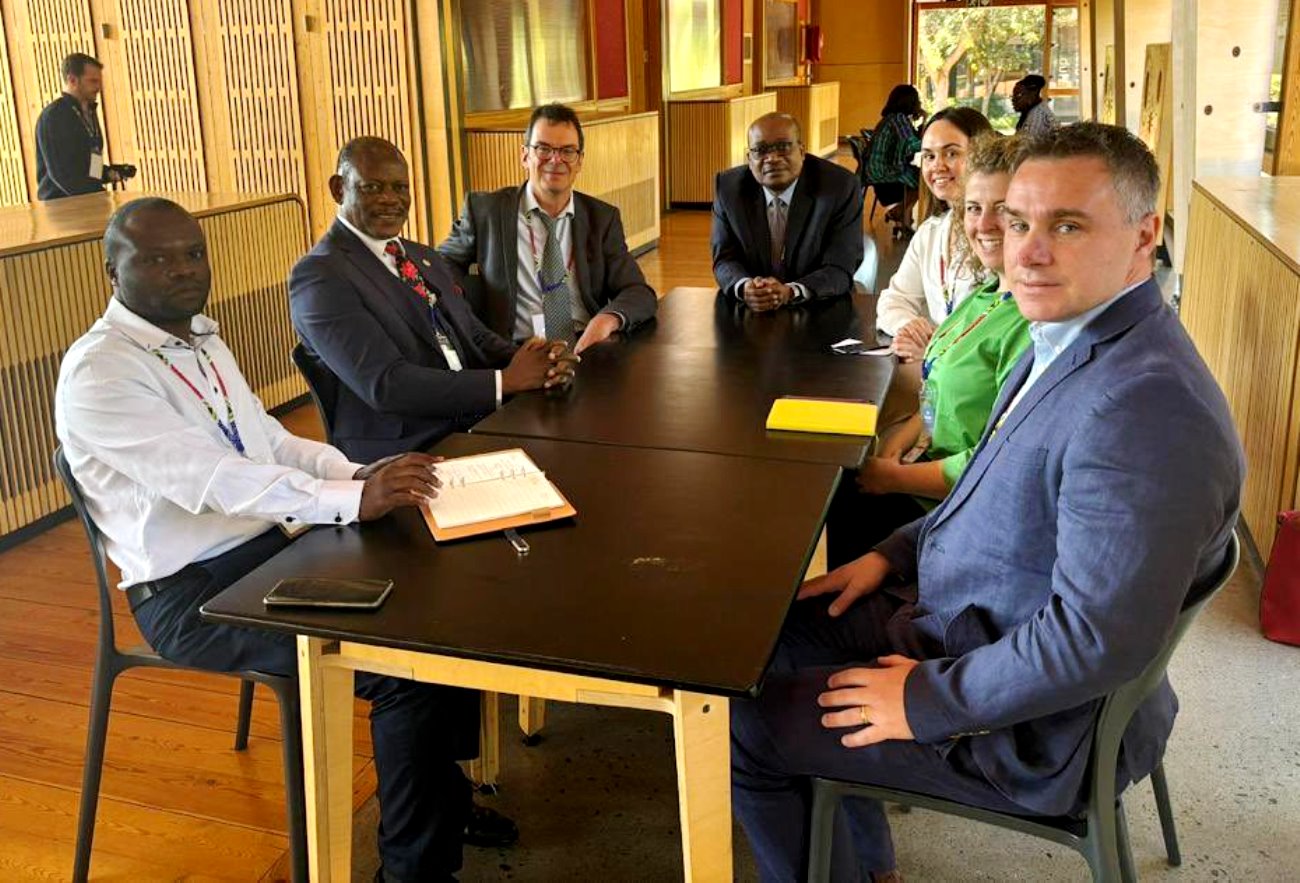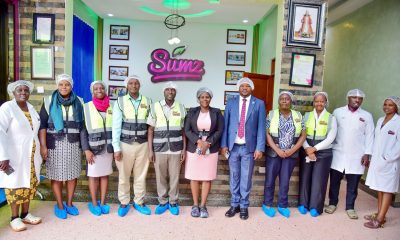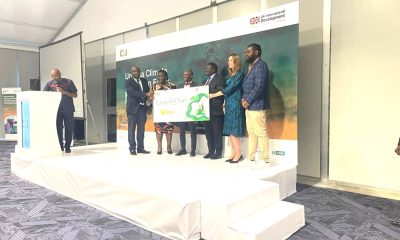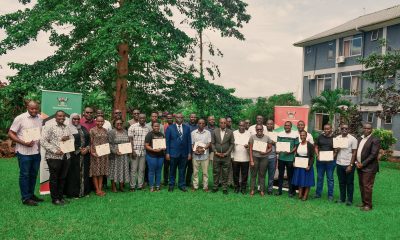On 22 – 23 May 2024, the Vice Chancellor, Professor Barnabas Nawangwe, joined the Worldwide Universities Network (WUN) and African Research Universities Alliance (ARUA) Presidents’ Forum at their Annual General Meeting (AGM) held at Future Africa Campus, University of Pretoria, South Africa. WUN is a network of twenty-four (24) world-leading teaching and research-intensive universities across six (6) continents, which facilitates collaboration across institutions in order to strengthen the impact of their work. On the other hand, ARUA is a network of sixteen (16) of the Africa region’s leading universities mainly aimed at expanding and enhancing significantly the quality of research done in Africa by African researchers.
This year’s AGM was held under the theme: “Addressing Global Research Challenges in an African Context” and this theme was canvassed under five major thematic areas:
- Establishing Equitable Research Partnerships – mapping the historical perspectives and way forward
- Building Successful Projects/Collaborations: experiences and lessons from different universities
- Developing Research Careers – through PhDs and Postdoctoral Trainings and early faculty career development opportunities
- Maximizing the Benefits of Partnership – tackling research challenges effectively through global partnerships and engagements
- Opportunities for WUN and ARUA and how to harness the networks.
Prof. Barnabas Nawangwe chaired two thematic discussions, where he also shared the experiences of Makerere University in building and sustaining effective North-South and South-South partnerships for capacity building, knowledge sharing, and research. The Vice Chancellor shared experience of two successful models of collaboration: 1) the Makerere University – Karolinska Institutet collaboration, through which hundreds of PhDs have been trained at Makerere University through the double PhD arrangement; and 2) the NORHED funded collaboration – a long-standing collaboration dating more than 15 years. Prof. Nawangwe noted that these two collaborations have been very instrumental in faculty training and capacity building at Makerere University, to the extent that now Makerere University has more than 70% of its staff with PhDs. Prof. Nawangwe attributed the success of the collaborations to the openness, trust, and mutual respect among the partners. He noted that even when the Northern partners provided funding, they allowed Makerere University to determine the priority research areas that students wanted to pursue. This way, students’ research became relevant to local challenges.
It was noted that Universities in Africa were facing immense pressure and challenges to continue to deliver quality teaching and research. These challenges related to low funding including low investments in Lab infrastructure, and research and development, limited infrastructure, limited number of faculty with PhDs, high staff to student ratios, among others. Surmounting these challenges required deepening research skills within specific disciplines, developing staff with multi and inter-disciplinary skills, developing staff with transferable and soft skills, and most importantly identifying new partnerships and collaborations while sustaining existing ones.
To strengthen PhD training to prepare the next generation of researchers, ARUA had received funding support from Mastercard Foundation and other partners to train up to 100,000 PhDs in Africa in the next 10 years. It is believed that this will boost Universities’ capacities to undertake their mandates and contribute to social transformation of Africa.
Participants also noted that while it is important to focus on PhD trainings, its also important to focus on building careers of University Faculty beyond PhDs. There is more to just getting a PhD degree, a lot of development must happen at Postdoctoral level if Universities are to enhance research capacity. These post-doctoral capacity building initiatives require clear, deliberate, and intentional institutional frameworks including partnerships to achieve. Young faculty need to be supported and mentored as they embark on careers in research. Beyond identifying and building North-South partnerships, it was imperative that African Universities continue to work with each other in South-South arrangements to optimize already existing – yet untapped potentials – within African institutions
Professor Nawangwe meets with team from University of York
The University of York has been a longstanding partner of Makerere University mainly in terms of supporting the Innovations Hub and previous work with the Infectious Diseases Institute (IDI). The Centre for Health Economics (CHE) has since 2017 been working with the School of Public Health (MakSPH) to support policy and decision-making at the Ministry of Health. Through the Thanzi La Onze (TLO) collaboration program, University of York is focused on capacity building for health economics and policy in Uganda and the region. The CHE has partnered with MakSPH under the Health Economics and Policy Program (HEPP) to support the establishment of a Master of Health Economics graduate program at Makerere University, which is going to be the first of its kind in the region. Program approval processes are currently ongoing.
Prof. Nawangwe and the York team also discussed additional collaboration in the areas of Artificial Intelligence (AI) and Environment, Climate Change, and Health.
In the meeting, it was noted that the University of York’s Assuring Autonomy, Centre for Doctoral Training in Safe AI, and the wider initiative – the Institute for Safe Autonomy are already existing initiatives that both institutions could explore working on. On his part, the Vice Chancellor, Prof. Nawangwe noted that Makerere University had a growing interest in the area of AI and already different initiatives were ongoing. He noted a strand of work on AI at the College of Computing and Information Sciences (CoCIS) led by Dr. Rose Nakasi who is working on the AI-Health Lab, where Artificial Intelligence and data science are applied to support and solve health-related challenges especially in the developing world. Makerere University also hosts another AI lab, headed by Dr. Joyce Nabende. Also, under the ARUA-Guild Cluster of research excellence, formed in 2023, there is a cluster on ‘AI, Data Science and Computational Thinking’. The Cluster is a collaboration between University of Stellenbosch (as ARUA lead), Uppsala (Guild lead), Makerere, Coventry, Nairobi, Rwanda, Rhodes, Lagos and Warwick. At Makerere University, the Cluster is coordinated by Prof. John Mango and Dr. Joyce Nabende. Makerere University is scheduled to host a summer school for three weeks (starting 8th July 2024) on Mathematics for AI. The school is jointly organized by the Eastern Africa Universities Mathematics Program (EAUMP), ISP-Sweden, Department of Computer Science and Department of Mathematics at Makerere, Lappeenranta University in Finland, ICTP-Italy, The International Center for Pure and Applied Mathematics (CIMPA) among other institutions.
Next steps
The meeting appreciated the need to continue to work together to advance the mutual interests of the two institutions. It was agreed that follow-up conversations should happen more especially between the team leads at the two institutions to explore opportunities for working together on not only the existing, but also new strands of work. Prof. Nawangwe appreciated the University of York for all the support and committed to follow up on the conversation and specifically the master of Health economics program development process between School of Public Health and School of Economics.


 General16 hours ago
General16 hours ago
 General15 hours ago
General15 hours ago
 Humanities & Social Sciences2 weeks ago
Humanities & Social Sciences2 weeks ago
 General1 week ago
General1 week ago
 Agriculture & Environment2 weeks ago
Agriculture & Environment2 weeks ago










